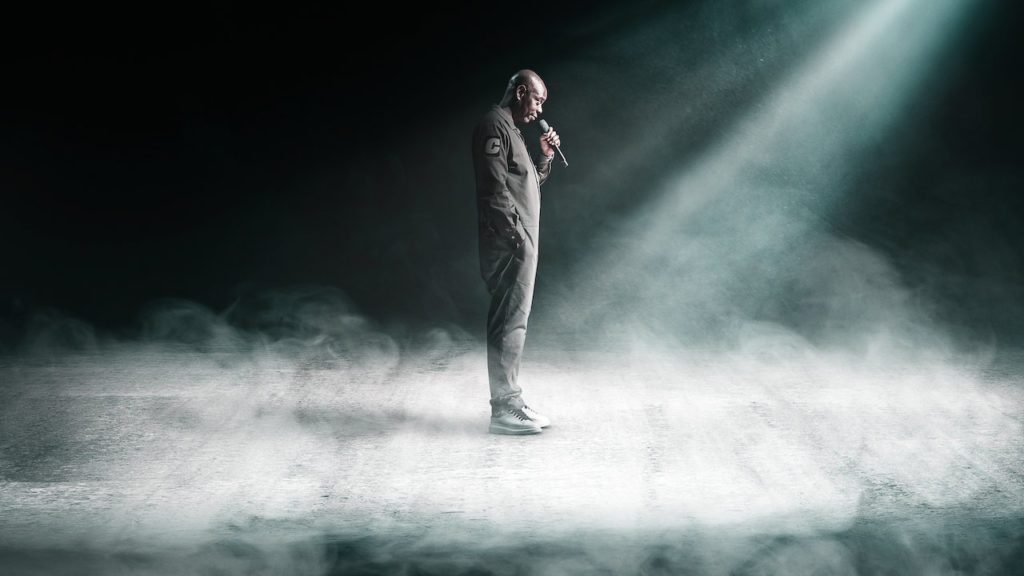Summary
In his deliberately provocative new special, Dave Chappelle continues to antagonize his most ardent critics and reminds us of something essential about comedy in doing so.
If there was a Mount Rushmore of comedy, Dave Chappelle’s face would most certainly be etched there, as much for what he hasn’t done throughout his career as what he has actually accomplished. Rare is the man who will turn down an ungodly sum of money to discontinue the most popular sketch-comedy show ever; something that, in a CBS interview, Chappelle described as being similar to a baboon stuck in a thirsty bushman’s salt trap. He was, in his words, smart enough to let go of the salt, and from there he virtually disappeared from the comedy consciousness. When he returned, most prominently as a host of Saturday Night Live in 2016 and in four Netflix specials — Deep in the Heart of Texas, The Age of Spin, Equanimity, and The Bird Revelation — in 2017, he found himself adrift in a whole new world of complicated social politics and gradually-tightening parameters of acceptability. He was an old comedian in this new world — and he didn’t fit in it. In his new hour, Dave Chappelle: Sticks & Stones, he still isn’t welcome. And he still doesn’t care.
Of course, Chappelle is uniquely positioned not to care — he’s Dave Chappelle. The most beloved comic of our era can outpace cancel culture without breaking a sweat; he has such cultural cache at this point that he can virtually get on stage and say whatever he likes, which he has done and been relentlessly booed for. It still made no difference to his career trajectory because, again, he’s Dave Chappelle. But the idea that Chappelle is an antiquated relic of a bygone, primitive age undersells how he became so popular and successful in the first place: He’s a great, smart, thoughtful comedian.
Dave Chappelle: Sticks & Stones proves this. It also proves he’s willing to say things that others aren’t precisely for that reason. He relishes the backlash. The #MeToo movement and the transgender community all hate him, and that’s great; as he says himself, he’s never going to get bored of telling jokes about those things, because it’s simply too funny not to. He’ll also defend his friends Louis C.K. and Kevin Hart, for masturbating in his own room in the case of the former and for telling homophobic jokes a decade ago in the case of the latter. As he says, now is the worst time ever to be a celebrity, since anyone famous is currently held to ridiculously puritanical standards. This has been a theme throughout his Netflix specials. He’s annoyed at the idea of, especially, treating what are clearly jokes as though they’re sincere statements. Sticks & Stones is littered with material — about Anthony Bourdain’s suicide, about Michael Jackson and HBO’s Leaving Neverland, R. Kelly and Lifetime’s Surviving R. Kelly, about abortion, mass shootings and the opioid epidemic — that juxtaposes genuinely thoughtful postulating with outrageous jokes, as if daring you to treat it all with the same level of seriousness.

It should be obvious that even though Chappelle says he didn’t believe Michael Jackson’s accusers that he doesn’t also believe that getting abused by the King of Pop probably isn’t so bad; one is, clearly, a joke. The same can be said of his gag that he wavers between pro-choice and anti-abortion depending on who he’s gotten pregnant; a sincere follow-up about how he actually supports a woman’s right to choose and believes men should have no say in the matter makes this quite clear. Yet the point of Dave Chappelle: Sticks & Stones is that simply because he made the joke, any genuine sentiment he expresses separately from it will be disregarded. Because in today’s climate there are certain subjects considered to be off-limits, any jokes about those subjects will intentionally not be taken as jokes. And this is a good point for a stand-up special — particularly a Dave Chappelle stand-up special — to make. Because it’s true.
Whether or not you find a joke funny is one thing, but pretending a joke is not a joke is something quite different. It defeats the essential purpose of comedy, which is to act as a salve for the wounds the world inflicts on us. To laugh at something is to sap its power, to make it manageable and less terrifying. We reflexively joke about things we don’t understand because we’re afraid our lack of understanding means the world is leaving us behind. Or we make fun of something we find ridiculous, simply because it is. That is and will remain everyone’s right. It should not represent the sum total of someone’s political beliefs or moral character. Chappelle refuses to operate in that kind of simplistic zero-sum territory. In addressing the backlash he received from “the alphabet people”, he crafts an analogy for how the movement is not a unified force, but a fractious collection of people with their own complex issues who happen to be sharing a car to the same destination.
Chappelle’s ride-share analogy isn’t the most digestible way of looking at LGBTQ+ issues, but it’s more truthful than many others. There are stops on the journey for gags about those who just want to hop in for the ride, and for those who’re making the trip take longer. It’s a shame that Chappelle’s responses to the trans community — his most ardent critics — are his weakest material; the most notable instance in Dave Chappelle: Sticks & Stones of the comic reaching for low-hanging fruit. But that shouldn’t discredit the points he makes elsewhere, about what equality truly means, about the ridiculousness of mass shooting drills, and the correlation between the current opioid epidemic and the crack epidemic of the ’80s and ’90s. How race plays a part in these things is, as ever with Chappelle, unavoidable; while he might occasionally be guilty of the same kind of conflations for which he rightly lambasts other people, his ability — and willingness — to openly and sincerely hone in on the issues he most identifies with ensure he’s as important a comic now as he ever has been. Perhaps the world hasn’t left him behind; perhaps he’s just ahead of it.



